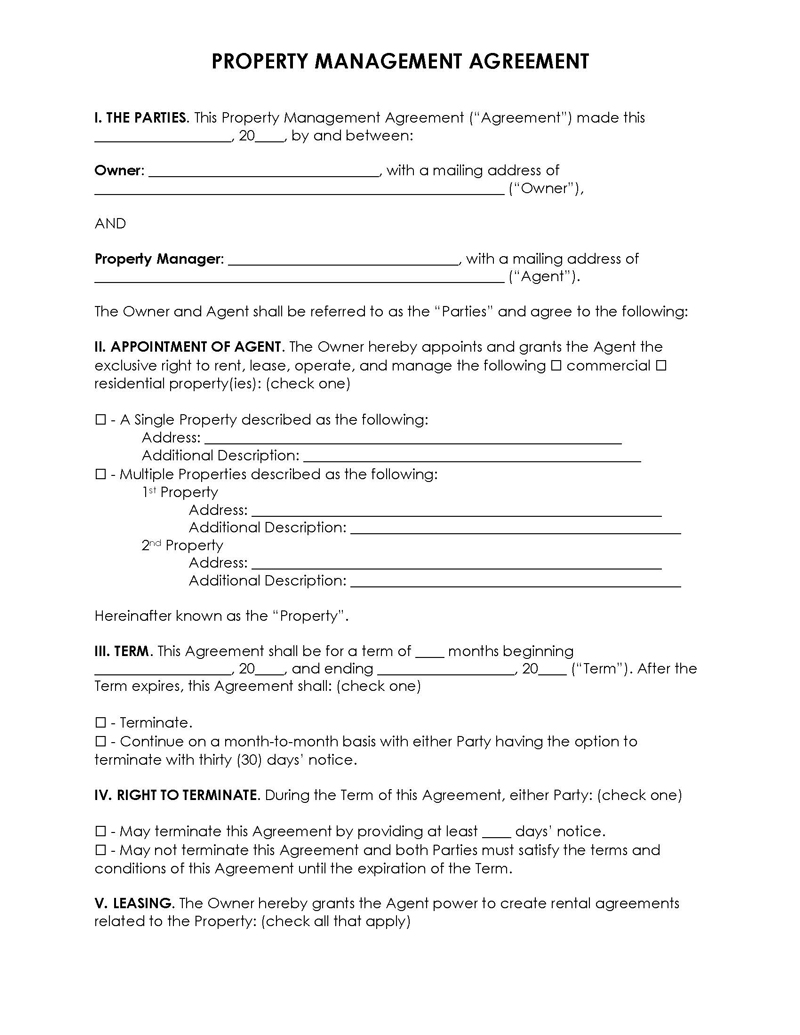A property management agreement is defined as a legally binding contract between a landlord and a property manager.
The property manager can be an individual or entity/company. The landlord agrees to compensate the property manager, typically a percentage of the total income generated from the property on a monthly basis, to take care of all of the legal responsibilities that come with renting out and maintaining your property.
Property management is not as easy as simply renting out your house or apartment and holding your breath until the check finally comes in the mail. It requires meticulous attention to detail and the willingness to do upkeep on a regular basis, not just when something needs fixing. This creates the need to create agreement for hiring a property manager to take up the associated responsibilities.
The landlord is normally responsible for preparing the agreement. The agreement outlines the terms and conditions of how you, as the property owner, would like your property to be managed.
The agreement also allows you, the landlord, to take a well-deserved break from property management, knowing that someone else will be taking over at no additional cost other than the agreed-upon amount. It also helps to write and record what each person will be expected to do, which helps avoid disputes later on. This article will help you understand why such agreement is important to you as a property owner and what it entails.
Free Templates
This agreement can be written from scratch; however, the most comprehensive option is to use a template or a fillable document that is designed specifically for the property management agreement. This will not only save you time but will also save you the effort of creating one.
We have provided such free and downloadable templates below:

By states
Property Manager Duties & Certification
A property manager is a middleman (individual or company) between a landlord and a tenant. He or she doesn’t own the property, but they maintain it in exchange for a portion of the rent that is collected on behalf of the people who actually own it.
The duties of a property manager include:
- Leasing the property
- Collecting rent payments from tenants
- Oversee maintenance and repairs
- Oversees screening of tenants
- Process lease renewals
- Marketing and advertising rental units
- Conduct property inspections during moving-in and move-out
- Be the link between the tenants and the property owner
Like all professionals, property managers are often required to have certain qualifications. The property manager should be a legal US citizen or a permanent resident. Also, all but six states require the property manager to have a property manager license or a real estate agent’s license.
The licenses are not required only in the states of Maine, Massachusetts, Maryland, Idaho, Kansas, and Vermont.
Certifications that better equip a property manager include:
- Certified Property Manager (CPM)
- National Apartment Leasing Professional (NALP)
- Residential Management Professional (RMP)
- Certified Apartment Manager (CAM)
- Certified Manager of Community Associations (CMCA)
- National Apartment Realtor (NAR) membership.
Always review the state-specific laws to determine which qualifications are needed before hiring a property manager.
When and Why Do You Need this Agreement
You need such agreement when you have someone managing your property in exchange for a percentage of your overall revenue. Thus, a management agreement for property should be made before you hire the property manager. The agreement will help you and your property manager know what to expect from one another. It provides a clear picture of the property manager’s services and fees associated with managing the property and determines if hiring the property manager is a good investment.
By outlining the terms of the agreement between you and the property manager in writing, the contract ensures there is paperwork that can be referenced to help clarify any potential conflicts between the two parties during and after the employment. In addition, the property manager’s responsibilities are clearly spelled out in the agreement. This way, you, as the landlord, can create a document that reflects your needs from the arrangement.
This agreement comes with certain benefits. It ensures there is a tool that can be referenced to determine the guidelines or instructions of your arrangement with the property manager. It also outlines the terms and conditions that may warrant the termination of the agreement and the correct procedure to undertake this exercise.
Before termination, most property management agreements require 30-90 days’ written notice. Lastly, this agreement is more legally enforceable than a verbal or handshake agreement. This way, you are protected from any liability issues you do not wish to take up.
Having an agreement in place gives you peace of mind by assuring you that someone is contractually carrying out specific tasks of managing your property without your close supervision since they are legally and financially liable for any negligence or incompetence.
But, How Does it Work?
Finding the right property manager can be a hassle but is usually worth the effort and time. Therefore, you should make it your objective to find the person or agency most suitable for the position.
Below is a comprehensive procedure for hiring a property manager and a guide on how a management agreement for property is utilized in this process.
Step 1: Find a real estate agent
Real estate agents are well-versed in property management. Therefore, you can search for active real estate agents in your area and list down those that are in charge of similar properties. You can use online platforms that showcase listings of different properties to discover new real estate agents.
Step 2: Ask questions
Next, you can narrow down the real estate agents who have caught your attention and conduct interviews to determine their suitability for the property manager role. During the interviews, you can ask questions regarding how many rental units are already under their management, the usual rates for managing property, how long they’ve been in property management, how they collect rent, how many vacancies they currently have, and any other relevant questions.
Another aspect to consider is their process of screening rental applications since it often influences the quality of tenants that will occupy your building. Once you have settled on a particular property manager, you can inform them of your decision and proceed to the next step.
Step 3: Negotiate the rates
The third step is to negotiate the rates with your chosen property manager. You should, in this stage, finalize the terms of your agreement. This is when the property management agreement comes in handy.
The main terms of the agreement include:
- How long will they manage the property
- The rate or percentage of gross revenue you are willing to pay them
- Additional fees the landlord is meant to cover
- Their job description and their duties (both secondary and primary)
- The period you will be paying them can be monthly, quarterly, or yearly.
The payment rates will vary from one real estate agent to another. For example, most residential property managers will charge an 8%-12% rate for apartments (1-4 units), condominiums, and homes, while most commercial property managers charge an 8-10% rate for industrial warehouses, offices, and retail spaces. The type of lease also influences the payment rate.
EXAMPLE
A Triple Net (NNN) lease attracts a 0.5-2% rate. Additionally, vacation homes attract a 10-40% rate. Property managers can also be compensated with salary payments; for example, $28.05/hr is generally acceptable.
Step 4: Write the property management agreement
After you’ve decided on your rate and other terms, you should then write this agreement. You can also use a template for preparing an agreement document. Ensure that both parties sign the document into effect.
Contents of Property Management Agreement
The agreement will vary from one property to another, depending on the arrangement between you and the property manager. However, some components of the agreement will be consistent.
Therefore, if you are to use a template or write the agreement from scratch, you should consider including the following components of an agreement:
Parties information
The agreement must identify the parties bound by its contents. This includes the landlord and the property manager. You will thus need to include your full name, address, and phone number, as well as that of the property manager.
General
The document should then provide generic details such as the name and address of the property in question. Any other general information can be added in this section of the agreement.
Duration of the contract
The agreement should indicate the term of the agreement – this is often one year but can be extended if necessary. The duration should be given in words and figures for clarity.
Argent’s responsibilities
Include what the responsibilities of your property manager are. All the duties, both primary and secondary, should be clearly stated in the agreement. The most common responsibilities are finding and screening tenants, collecting rent, property maintenance and signing and renewing contracts and compliance documents.
Property owner’s responsibilities and limitations
As the property owner, you also have certain responsibilities that you have to fulfill under the agreement. The agreement should outline these responsibilities explicitly. Some of the common duties of a property owner are setting aside reserve funds for maintenance and emergencies, property insurance, and signing lease agreements.
Agent liability and compliance issues
The agreement should have a section that outlines what aspects of the arrangement each party can be held accountable for. Clarifying the liabilities ensures that you are protected from any claims made as a result of the property manager’s actions. This way, claims against the property manager and you as the property owner can be separated. This section should also specify which party is responsible for the different applicable compliance requirements. Compliance requirements may require you to review state laws and local rental laws.
Payment and fees
You should also include the details of payment and fees. What are the payment terms? How will you be paying them? Who will be responsible for paying what? Also, include in this section the property manager’s fee, whether it is a percentage, a fixed, or an hourly payment.
Funding
Managing a property typically comes with some expenses. The property manager’s operational and maintenance expenses will usually be deducted from the revenue collected or reserve fund – therefore, the agreement should clarify.
Insurance
The property management should outline the type of insurance each party ought to have to ensure all interests are protected. A list of the required types of insurance can be provided.
Termination clause (with notice and by default)
The terms and conditions and procedure for termination should also be provided. Most agreements stipulate that termination should be done through notice. The agreement should state the notice period applicable for the arrangement. A list of actions that ought to precede the termination date should also be given. This information is given in the form of a termination clause. This section should declare that failure to perform contractual obligations (default) would warrant termination of the agreement.
Succession
The agreement should include provisions for transferring the parties’ duties to their successors if needed. This ensures the successors of either party honor the property management agreement even in the absence of the original signatories.
Governing law
A section of the document should explain where the agreement is to be implemented. This can be done by providing the name of the state where the associated property is located.
Amendments
The agreement should include provisions for amending the document if needed. This is also a very important component of the agreement for property management because changes are often inevitable, and modifying the agreement would be much faster and easier than creating an entirely new agreement
Assignment
A section should clarify that neither party can re-assign any duties assigned to them to other parties through the document. The statement should declare that this is prohibited unless both parties have agreed to it.
Alternative dispute resolution
Disputes are always likely to happen at some point in the future. The agreement is expected to mitigate such events by providing the primary and secondary dispute resolution methods that each party should resort to if conflicts erupt. Negotiation, mediation, arbitration, and litigation are common dispute resolution measures.
Entire agreement
The superiority of the agreement should be clarified through a declaration. The declaration should state that the agreement is the only valid agreement in regard to the arrangement, and any terms not expressly provided in the document shall be subject to those specified in the agreement.
Severability
You should include provisions for severance. This means that if one clause becomes invalid by the law or court determination, then the rest of the document will still be valid.
Signature and date
Lastly, each party must provide their signature. First, as the owner, you should provide your name, followed by your signature and the date of signing. Similarly, the agent must provide their details. After signing,the agreement becomes valid and enforceable.
Frequently Asked Question
It is best to make use of the provisions in the agreement so that you know how to end it appropriately. Ordinarily, you should start by contacting your property manager through a notice within the applicable notice period.
Property managers can legally sign leases for their property owners even if they are not licensed real estate agents. This is provided that the agreement includes all the necessary terms and conditions that permit them to do so. Therefore, it is acceptable to grant your property manager the legal authority to sign lease agreements.
The property manager’s rate depends on the size and type of the property as well as its location (rental rates). You should know the average rate for this type of work in your area before coming up with your own payment terms. Typically, they are paid in the percentage of revenue gained from leasing. Therefore, this aspect of property management is usually up for negotiation before entering into an agreement with a property manager.
There are no specific laws on this subject in most states in the US. However, as per the real estate laws in some states, it is mandatory for property managers to be licensed. Two licenses are commonly acceptable; a property manager license and a real estate broker license.
For property managers, it is generally necessary to have insurance that covers: Errors and Omissions (E&O) Insurance and General Liability Insurance.












